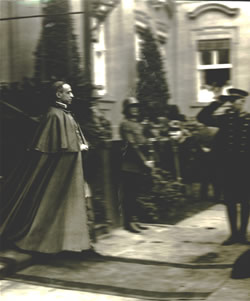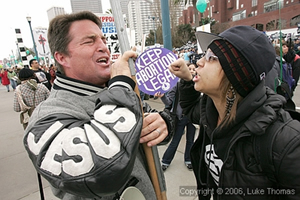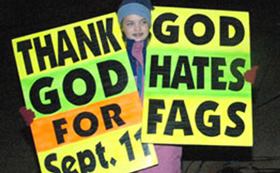Paul's "Previous Way of Life":
From Violent Aggression to Indiscriminate Love
For Sunday June 10, 2007
Lectionary Readings (Revised Common Lectionary, Year C) hotlink: )
1 Kings 17:8–16, (17–24) or 1 Kings 17:17–24
Psalm 146 or Psalm 30
Galatians 1:11–24
Luke 7:11–17
 |
Pope Pius XII. |
Exactly four days after Eugenio Pacelli (1876–1958) was elected as Pope Pius XII in February of 1939, he wrote a letter to "the Illustrious Herr Adolf Hitler, Fuhrer and Chancellor of the German Reich!"
Here at the beginning of Our Pontificate We wish to assure you that We remain devoted to the spiritual welfare of the German people entrusted to your leadership. . . During the many years We spent in Germany, We did all in our power to establish harmonious relations between Church and State. Now that the responsibilities of Our pastoral function have increased Our opportunities, how much more ardently do We pray to reach that goal. May the prosperity of the German people and their progress in every domain come, with God's help, to fruition!
Thus did "Hitler's Pope," as John Cornwell's book title calls Pius XII, flatter one of the greatest moral monsters in history.
This example of religion's collusion with evil comes from the new bestseller God Is Not Great (2007) by Christopher Hitchens, who uses it and many other hypocrisies to try to show how "all the claims of established religion are bogus, and man-made, and undeserving of anything but contempt and ridicule." I think he fails to achieve his lofty goal. But Hitchens does succeed in an unfortunately much easier and important task, which is to remind us just how malevolent religion can be. Cruelty and coercion, intimidation and intolerance, bigotry and bloodshed—these, Hitchens chronicles in page after page, are the religious toxins that poison the world today.
 |
The apostle Paul's autobiographical remarks in this week's epistle provide another case study of what Hitchens rightly detests about religion, and a trenchant reminder of how horribly misguided religious sincerity can be. Before his conversion, Paul was a violent, religious fanatic. After his conversion, though, he summarized the entire Bible of his day in five words: "Love your neighbor as yourself" (Galatians 5:14). Don't ever weary in taking every opportunity to "do good to all people," he told the Galatians (6:9–10).
Which is to say that Paul's story is also a paradigm of how authentic religious conversion, which has a beginning point but no end, validates itself by the repudiation of hatred in all its guises and the demonstration of indiscriminate love for all people.
Scattered throughout the New Testament, Paul describes himself as a former religious zealot who tried to exterminate the early Christian movement. He supported the stoning of Stephen, the first Christian martyr (Acts 7). "Breathing threats of murder," Paul collaborated with authorities to track down believers from house to house, drag them back to Jerusalem, and then imprison them in an effort to make them renounce their faith. He worked fervently to "destroy the church" (Acts 8:3, 9:1).
To the Galatians Paul wrote, "For you have heard of my previous way of life in Judaism, how intensely I persecuted the church of God and tried to destroy it. I was advancing in Judaism beyond many Jews of my own age and was extremely zealous for the traditions of my fathers" (1:13–14). Writing to the Philippians he bragged, "as to zeal, a persecutor of the church" (3:6). Even as an old man Paul seems to have been haunted by memories of his abusive past. Near the end of his life when he wrote his protege Timothy, he regretted that he was "formerly a blasphemer and a persecutor and a violent aggressor" (1 Timothy 1:13). To the Corinthians he admitted that he didn't deserve to be called an apostle, and was at best the "least of the apostles" because of his manic violence (1 Corinthians 15:9).
 |
People instinctively discounted the stories about Paul's conversion that began to circulate. When he returned to Jerusalem after his conversion in Damascus, "he tried to join the disciples, but they were all afraid of him, not believing that he really was a disciple" (Acts 9:26). Barnabas, aptly nicknamed "son of encouragement," vouched for Paul and eventually reconciled him with the church in Jerusalem. Paul remained personally unknown to most believers, of course; as he wrote to the Galatians, "People only heard the report: 'The man who formerly persecuted us is now preaching the faith he one tried to destroy'" (1:23).
As Hitchens shows in his book, many believers today try to prove the authenticity of their religious faith through overt bigotry, cruelty, and sheer stupidity, whether spewing hate at gays, peddling junk science, blowing themselves up, or coddling state power. In contrast, when Paul was "apprehended" (Philippians 3:12), as he put it, by Jesus on the Damascus road, his conversion proceeded in the diametrically opposite direction, from violent aggression to indiscriminate love.
Instead of building his own spiritual fiefdom, Paul couldn't even remember whom he had baptized. Rather than getting rich off the gospel, he publicly boasted that he preached free of charge and coveted no one's money. He actively opposed the slightest hint of any personality cult predicated upon his reputation. He sharply rebuked Christians who reveled in dogmatic certitude about theological minutiae. In stark contrast to people who rightly feared the pre-convert Paul because of his fanatical violence, he resorted to irony and "apologized" to those who complained that whereas his letters were "weighty," in person he came across as timid and unimpressive. His limited cooperation with state power resulted in beatings and jail time, not special pleading for unique privileges. To the fakers and posers who hustled themselves as super-apostles, Paul boasted about his many weaknesses and sufferings. Dubious displays of outward religiosity, said Paul, have no value.
A lawyer once asked Jesus an obvious question. Are some parts of the Bible more important than others? Which laws are peripheral and insignificant, and which ones are weighty and essential? Jesus responded that "the most important one is this: 'Hear, O Israel, the Lord our God, the Lord is one. Love the Lord your God with all your heart and with all your soul and with all your mind and with all your strength' [Deuteronomy 6:4]. The second is this: 'Love your neighbor as yourself' [Leviticus 19:18].
 |
Jesus thus drew a necessary connection between claiming to love God and demonstrating that we love our fellow human beings. This connection became so embedded in the early Christian traditions that it's repeated almost verbatim by Paul (Romans 13:8–9, Galatians 5:14), by James (James 2:8), and most memorably by John: "If anyone says, 'I love God,' yet hates his brother, he is a liar. For anyone who does not love his brother, whom he has seen, cannot love God, whom he has not seen. And he has given us this command: Whoever loves God must also love his brother" (1 John 4:20–21).
Even though I disagree with Hitchens, I'm glad I read his book. His 300 pages of painful reminders of gross hypocrisy and pseudo-spirituality wouldn't have been such bitter medicine if we Christians had kept the main thing the main thing. "The only thing that counts," wrote Paul, "is faith expressing itself through love," for without concrete deeds of love, we're "nothing" (Galatians 5:6; 1 Cor. 13).
For further reflection:
* What has been your experience of religious violence, whether physical, verbal, political or psychological?
* Are there certain types of people whom you find hard to love?
* What are some of the excuses we give for placing other priorities ahead of indiscriminate love for all people?
* Cf. Saint Maximos the Confessor (580–662): "Blessed is the one who can love all people equally...always thinking good of everyone."
* See Must Christianity Be Violent?: Reflections on History, Practice, and Theology, by Kenneth R. Chase and Alan Jacobs





